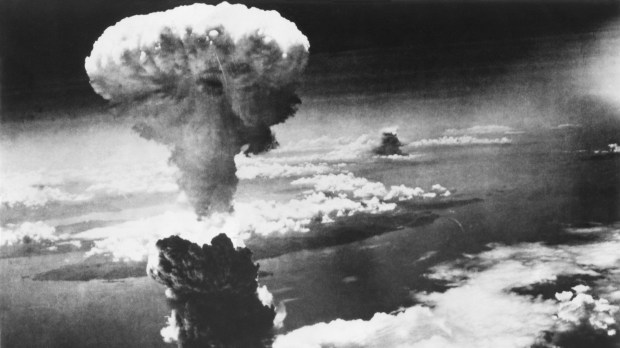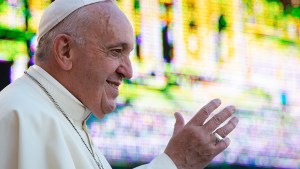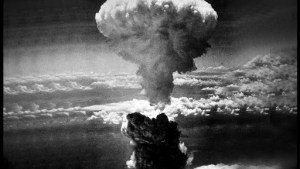Fr. George Zabelka was an American Catholic priest of Austrian origin, and like many young men of his generation, he enlisted as a chaplain in defense of his country during World War II. His mission was to spiritually accompany the nearly 2,000 men of the 509th Group, the unit trained to drop the atomic bomb on Japan.
Not that Zabelka was a militarist (he always told his faithful that murdering civilians in cold blood was not acceptable), but he shared the sentiment of that harsh era: fighting the Axis was a “just war,” and somehow, the end justified the means.
When he learned that the two bombs, Little Boy and Fat Man, had killed hundreds of thousands of civilians, he was very sorry, but still thought that his boys had done “the right thing” to end that war once and for all.
But Fr. Zabelka’s convictions began to crack when he learned that one of the bombs had been dropped on Nagasaki, Japan’s most Catholic city: the young priest realized that he had sent his Catholic boys to murder other Catholics! In a speech he gave in 1985, he remembered that moment, lamenting his own complicity:
As a Catholic chaplain I watched as the Boxcar, piloted by a good Irish Catholic pilot, dropped the bomb on Urakami Cathedral in Nagasaki, the center of Catholicism in Japan. I knew that St. Francis Xavier, centuries before, had brought the Catholic faith to Japan. I knew that schools, churches, and religious orders were annihilated. And yet I said nothing.
Full of remorse, the young priest went to the hospitals where thousands of bomb victims were agonizing in terrible pain. He spoke with many of the survivors. He decided, finally, not to return to the United States, but to remain as a chaplain in Japan, serving his former enemies.
He spent the rest of his life actively fighting for peace and alerting the world to the dangers of the atomic bomb. In 1984, the aging priest made a pilgrimage from Tokyo to Hiroshima to ask forgiveness from the hibakushas, the Japanese survivors of the bombs.
I fell on my face there at the peace shrine after offering flowers, and I prayed for forgiveness—for myself, for my country, for my church. Both Nagasaki and Hiroshima. This year in Toronto, I again asked forgiveness from the Hibakushas present. I asked forgiveness, and they asked forgiveness for Pearl Harbor and some of the horrible deeds of the Japanese military, and there were some, and I knew of them. We embraced. We cried. Tears flowed. That is the first step of reconciliation—admission of guilt and forgiveness. Pray to God that others will find this way to peace.
He spoke out harshly against Church leaders condoning violence, recognizing his own role with humble contrition:
As an Air Force chaplain I painted a machine gun in the loving hands of the nonviolent Jesus, and then handed this perverse picture to the world as truth. I sang “Praise the Lord” and passed the ammunition. As Catholic chaplain for the 509th Composite Group, I was the final channel that communicated this fraudulent image of Christ to the crews of the Enola Gay and the Boxcar.
All I can say today is that I was wrong. Christ would not be the instrument to unleash such horror on his people. Therefore no follower of Christ can legitimately unleash the horror of war on God’s people. Excuses and self-justifying explanations are without merit. All I can say is: I was wrong!
It’s been almost 80 years since the bombs were dropped, but the world is still plagued by war. In the encyclical Fratelli tutti (#258), Pope Francis’ words share Fr. Zabelka’s rejection of war:
The truth is that “never has humanity had such power over itself, yet nothing ensures that it will be used wisely”.[241] We can no longer think of war as a solution, because its risks will probably always be greater than its supposed benefits. In view of this, it is very difficult nowadays to invoke the rational criteria elaborated in earlier centuries to speak of the possibility of a “just war.” Never again war!
Let us pray for peace, and let us pray that God will enlighten the minds of those who use religion to justify violence, that they may understand that we are all God’s children, called to love even our enemies (see Mt 5:43-48).



